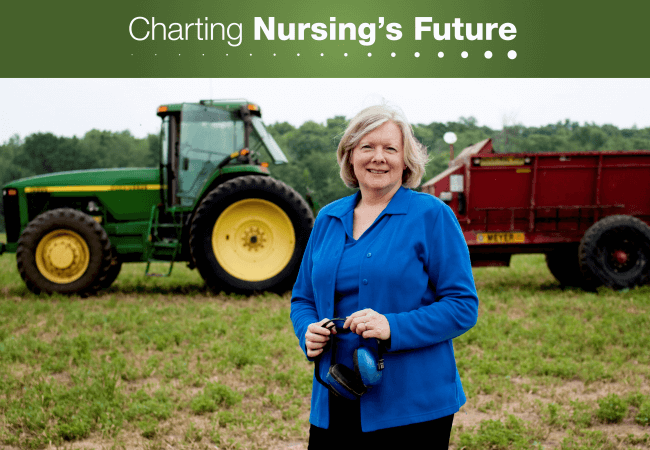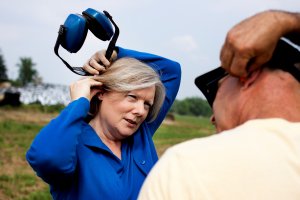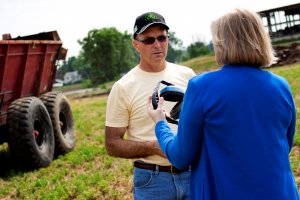
Feb 04, 2019
Nurse Partners with Farmers to Protect Their Hearing and Health

Marjorie McCullagh, PhD, RN, FAAOHN has partnered with the American Farm Bureau Federation and Progressive Agriculture Foundation to create effective interventions to protect farmers’ hearing and health. Credit: Photo courtesy of University of Michigan School of Nursing
Farming is a noisy business. Even while cocooned in a modern tractor, farmers are exposed to high levels of noise, often for hours on end. When they cut wood with a chainsaw or operate a grain dryer, their ears are assaulted by approximately 110 decibels of sound, similar in volume to a loud rock concert.
Regular exposure to noise at or above 85 decibels causes gradual, irreversible hearing loss. By high school, farm kids’ hearing is not as good as that of their classmates. By age 30, many agricultural workers have experienced substantial hearing loss. Decreased hearing acuity increases farmers’ risk of injury and is now known to increase the long-term risk of dementia, heart disease, social isolation, and depression as well.
Marjorie McCullagh, PhD, RN, FAAOHN, director of the Occupational Health Nursing Program at the University of Michigan School of Nursing, became interested in the link between hearing and overall health while studying for her doctorate. “One of my mentors had an interest in hearing loss prevention and was working with automotive assembly plant workers in Detroit,” McCullagh says. “I was in North Dakota and wanted to do something that was relevant to my community.”
Audiologists had documented the problem of noise-induced hearing loss in the agricultural sector, “but no one was doing anything about it,” McCullagh says. She decided to apply her considerable nursing skills to the issue. “I had been in public health, so it was part of my skill set to be able to reach out to a community, and my background as a nurse researcher prepared me to design, implement, and test interventions for effectiveness.”
Collaborations Key to Effective Interventions
McCullagh knew that any effort designed to protect farmers’ hearing would be all but useless without input from farm families and agricultural workers, so she reached out. Farm communities and organizations welcomed her interest, and McCullagh partnered with the American Farm Bureau Federation, the largest organization of farmers in the United States. By collaborating with the Farm Bureau, McCullagh gained access to databases that allowed her to survey a nationally representative sample instead of only reaching out to farmers in her area. This research helped her create and test five prevention strategies specifically designed to encourage hearing protection on the farm. The most effective intervention? Providing farmers with a variety of hearing protectors.

Marjorie McCullagh, PhD, RN, FAAOHN demonstrates the proper use of hearing protection. Credit: Photo courtesy of University of Michigan School of Nursing
“Farmers are not going to fire up the chainsaw and then hop back in the truck to grab hearing protection,” McCullagh says. “It has to be there at the noise source.” An ample supply of protective devices allows farmers to stash some in the tractor, some in the shop, and some in their pockets, dramatically increasing the odds that they will be used.
McCullagh has since partnered with the Progressive Agriculture Foundation (PAF), a national organization that provides safety training to rural and farm youth. “Marjorie was looking for a good way to work with kids on the farm and in rural areas,” says Jana Davidson, PAF’s education content specialist. “She knew our program reached that audience. It was a perfect fit.”
McCullagh designed, tested, and refined a youth-oriented hearing health program for the foundation. “We tested it in 36 different locations around the U.S. and compared outcomes after a year to figure out what worked and what didn’t,” McCullagh says. The resulting hearing safety program is now a part of PAF’s formal curriculum, which reaches more than 100,000 young people annually.

Marjorie McCullagh, PhD, RN, FAAOHN works with farmers to discover the best ways to protect and preserve their hearing. Credit: Photo courtesy of University of Michigan School of Nursing.
McCullagh’s work to protect the hearing and health of American farmers, a traditionally underserved population, has been recognized by the nursing community. In August 2018, the American Academy of Nursing named McCullagh an Academy Edge Runner for her hearing intervention program “Quiet4Healthy Farm.” This award is given to nurses who have designed innovative interventions which improve health, impact cost, and influence policy.
“Most programs are designed based on what the teacher thinks learners need to know,” McCullagh says. In contrast, she designs health education interventions based on rigorous research because she believes “this group of workers is deserving of high quality, effective programs to address their hearing health needs.”
McCullagh continues to partner with experts outside the world of health care. Currently, she is working with web designers and computer scientists from the University of Iowa. They are working on creating a smartphone app that will make hearing health information available to farmers on demand.
